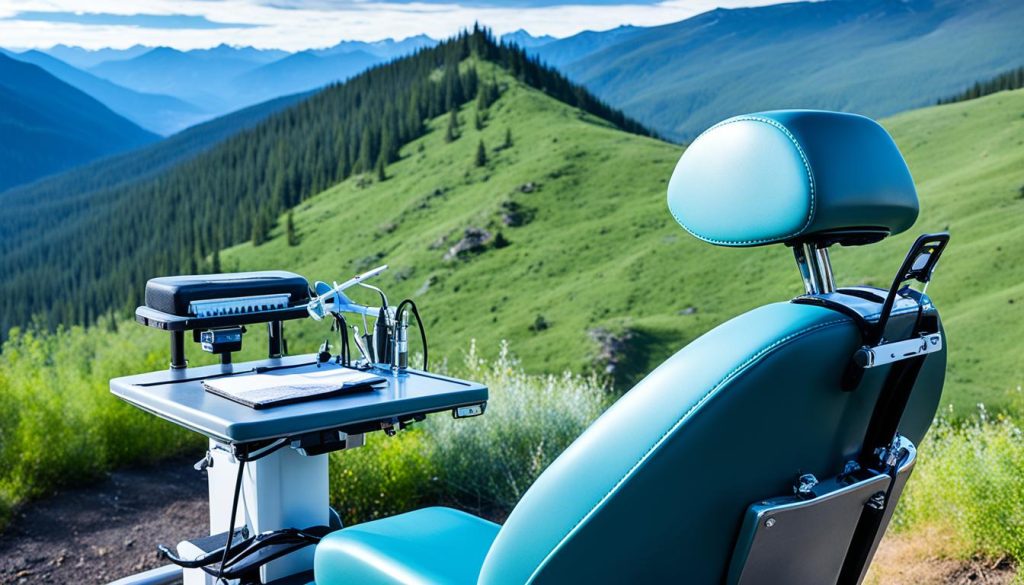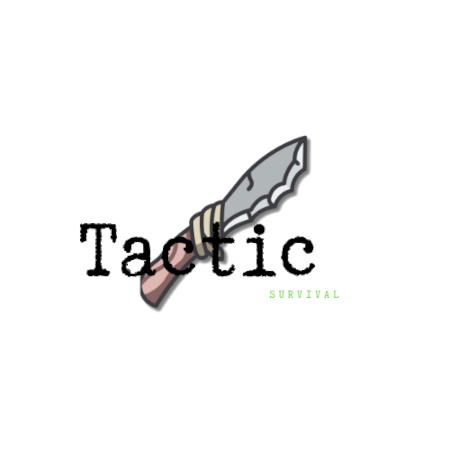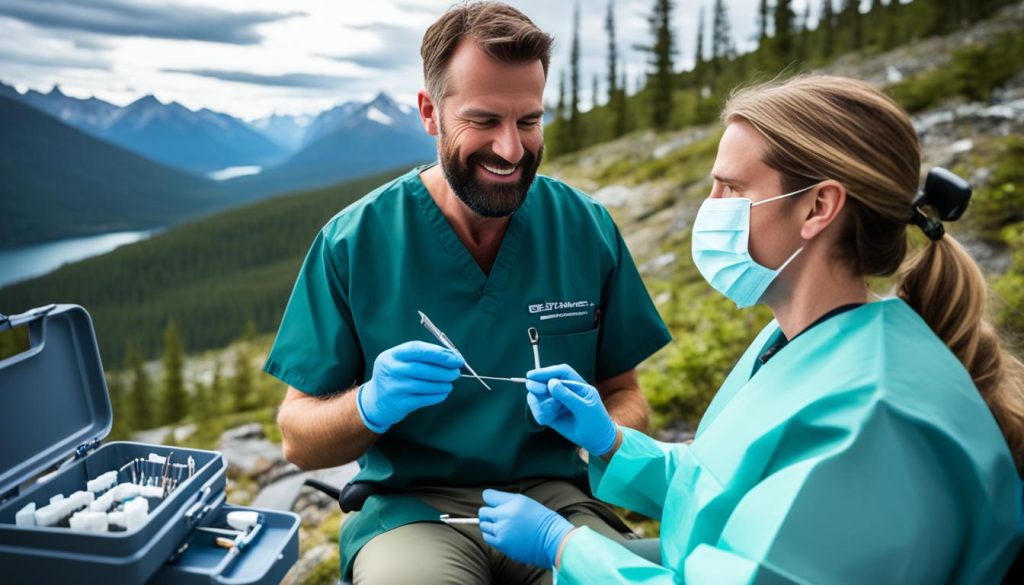Did you know that more people are taking wilderness expeditions than before? This trend means there’s a growing need for emergency dental care in these remote, often dangerous, places. If you’re far from help, especially days away from definitive care, wilderness expedition dentistry can save the day. It focuses on treating dental emergencies and easing pain in the wild.
Key Takeaways:
- Wilderness expedition dentistry addresses dental emergencies in remote settings.
- As more people engage in hazardous expeditions, the need for emergency dental care in the wild is becoming increasingly important.
- This field includes topics such as secondary care follow-up, training expedition medics, and organizing dental camps in remote areas.
- Wilderness expedition dentistry provides rewarding and unforgettable experiences for those involved.
- Immediate dental care and pain relief are crucial in remote locations where definitive care is often days away.
What is Wilderness Expedition Dentistry?
Wilderness expedition dentistry focuses on preventing and managing dental issues in remote places. This is key for long and hazardous trips, where getting help can take days. Dentists in this area play a vital role by offering dental care in tough, unpredictable locations.
In this field, beyond just treating immediate problems, professionals follow through with care. They also train medics, study how diseases spread, and help in places that need it most. This makes their jobs essential in various situations.
As wilderness dentistry grows, dentists need more skills in surgery and expedition medicine. This extra training helps them give the right care and advice for wild trips. It’s about being prepared for the unexpected.
Preventive Care in Remote Settings
Preventing dental issues is key in wilderness dentistry. Dentists teach people how to keep their teeth healthy, even when help is far. This stops a lot of problems before they even start.
The Importance of Definitive Care
Dentists in this field must also know how to fix serious issues. Accidents can happen far from help, needing quick, skillful treatment. Being able to handle these cases is crucial for everyone’s safety and comfort.
This work means dentists have to be ready for anything. It’s about creativity, toughness, and fast thinking. By blending their dental skills with knowing how to manage extreme situations, these professionals are a true lifeline in the wilderness.
“Wilderness expedition dentistry involves providing dental care in challenging and often unpredictable environments, where access to routine dental treatment is limited. The skills and expertise of dental professionals practicing in this field are essential for managing dental emergencies and ensuring the well-being of expedition participants.”
Below is a table showing the major aspects of wilderness expedition dentistry:
| Key Components of Wilderness Expedition Dentistry |
|---|
| Prevention and education on oral hygiene in remote settings |
| Assessment and management of dental emergencies |
| Secondary care follow-up |
| Training expedition medics in dental care |
| Conducting epidemiological studies in remote areas |
| Providing dental care in humanitarian settings |
Wilderness expedition dentistry is growing important. The demand for skilled dental experts in this area is likely to rise. This field offers unique experiences and lets professionals really make a difference in hard-to-reach places.
Benefits of Getting Involved in Wilderness Expedition Dentistry
Wilderness expedition dentistry doesn’t always pay the bills, but it’s truly rewarding. It lets dental pros offer care in places where it’s hard to find. This work can change lives and bring joy to both patients and dentists.
Volunteering at dental camps or helping in emergencies lets you touch many lives. Besides the work, you get to learn from other people’s cultures. This makes the experience richer for everyone involved.
Adventure dentistry pushes you to think outside the box. You must be creative to solve problems with few resources. It builds skills that are useful in any part of your career.
“The satisfaction and fulfillment of helping someone in dire need of dental care is unparalleled. It’s an incredible feeling to make a positive impact on someone’s oral health and overall well-being.” – Dr. Sarah Thompson, Wilderness Expedition Dentist
Wilderness dentistry isn’t just about work. It’s also about exploring new places and making new friends. Every trip, from serving on mountains to helping in tiny villages, brings amazing stories and a sense of togetherness with your team.
If you want an experience that changes you, try wilderness dentistry. You’ll do important work and share adventures that you’ll never forget.
Extra Qualifications for Wilderness Expedition Dentistry
To be top-notch in wilderness expedition dentistry, more skills are a must. A good handle on oral surgery is key. It broadens the kind of dental issues a dentist can fix far from civilization. This including major work in rough spots.
Another big boost is finishing an expedition medicine course. World Extreme Medicine has one that’s top-notch. It dives into medical hurdles of remote trips. This knowledge is gold for providing care where the unexpected is the norm.
Being fit is vital for these dentists. They often support trips and lug gear through tough areas. Keeping up physically means they can meet job needs without harm to themselves.

Example Expedition Medicine Courses:
- Wilderness Medicine Society’s Wilderness Emergency Medicine Workshop
- Wilderness Medical Associates International’s Wilderness First Responder Course
- Advanced Wilderness Life Support Course by the Wilderness Medical Society
“Mixing oral surgery know-how, expedition medicine skills, and staying fit makes wilderness dentists real heroes. They can handle tough dental cases in the wild. This all keeps everyone safe and healthy out there.”
More training makes wilderness dentists ready for any tooth emergency. They master surgeries, emergency medicine, and fitness. This combo prepares them for their special role, helping keep oral health in tip-top shape during expeditions.
Conditions and Situations in Wilderness Expedition Dentistry
Wilderness expedition dentistry covers many challenges that dentists face during expeditions. It mainly deals with dental care in two settings. One is through dental camps set up in remote places. The other is emergency dental care for people on missions in the wild.
Dental Camps in Remote Areas
Volunteers organize dental camps in remote places to help locals. These areas have little to no access to dental services. Dentists in wilderness expeditions provide basic treatments and check-ups in such camps. The goal is to better the oral health of those living in hard-to-reach places.
Dental Emergency Care During Expeditions
On expeditions, dental issues can arise and impact both the adventurers and locals. Dentists carrying portable clinics are ready for these emergencies. They treat problems like severe toothaches and dental injuries on the spot. This ensures people get the help they need right away, even in tough conditions.
Participating in these missions is not easy. Dentists must deal with limited resources and unfamiliar places. But, they get the chance to explore while making a real difference in people’s lives. These journeys often cover their travel and stay, which can be very appealing.
Helping out in dental camps or offering emergency care in the wild is very fulfilling. It gives dentists a way to serve communities that otherwise would not have dental care. This work also underlines the value of dentists who are ready to go beyond to meet oral health needs. They step into places where normal dental clinics can’t reach.
Dento-Legal Concerns in Wilderness Expedition Dentistry
When dentists work in the wild, they face special legal issues. The Good Samaritan Act helps with emergency dental care outside usual places. Yet, acting as a dentist on an expedition brings different legal rules. Knowing the laws around dentistry in the wild is critical.
In the wild, dental problems are common on trips. They often make up a big part of the need to take people to medical facilities quickly. This shows how important it is for medics on these trips to have basic dental skills. They should know how to handle these dental problems before they can get help from a dentist. Luckily, there are many ways to learn about dental care on these trips, so medics can help effectively when needed.
Working on dental problems during wilderness trips means understanding special laws and ethics. With the right information and training, dentists can offer crucial dental care. This keeps both them and their patients safe.
Dental Emergencies in Wilderness Expeditions
In the wild, dental issues can often be from accidents or get worse if left untreated. They can include severe pain, infections, broken teeth, or teeth knocked out. If not dealt with quickly, these issues can affect how well someone can carry on with the trip.
In places without easy access to regular dental care, medics with dental skills can help. They can do the first treatments to ease the pain and prevent problems from getting worse. This buys time until someone can see a real dentist.
Teaching medics specialized dental help makes a big difference. They learn to spot dental issues early and start treatments at once. They can also get advice from dentists easily if needed. This team effort in treating dental problems ensures everyone has good dental health on the trip.
| Dento-Legal Concerns | Solutions |
|---|---|
| Legal considerations when providing emergency dental care outside of regular practice | Understanding and abiding by the Good Samaritan Act to mitigate potential legal issues |
| Legal considerations when working as a dentist on an expedition | Seeking legal advice and understanding the specific legal requirements in the expedition location |
| Dental training for expedition medics | Ensuring expedition medics receive comprehensive dental training to provide effective prehospital care |
| Resources for dental training in wilderness expedition dentistry | Accessing educational materials and courses tailored for dental emergencies in remote settings |
Overseas Indemnity for Wilderness Expedition Dentistry
Going abroad to practice wilderness dentistry needs proper insurance. The Dental Defence Union (DDU) in the UK offers this. They help their members if they work overseas in certain cases.
Before starting work overseas as a wilderness dentist, talk to the DDU. Discuss adding overseas coverage to your membership. This way, you’re legally protected while working in far-off places.
This coverage gives you peace of mind. You’ll also have the backing of a trusted organization. This is crucial in difficult and new settings.
Keep your DDU membership active and look into overseas coverage. This ensures you can enjoy being a wilderness dentist. You’ll have the right protection and support.
| Benefits of Overseas Indemnity for Wilderness Expedition Dentistry: |
|---|
| 1. Legal protection and peace of mind |
| 2. Support from a reputable professional indemnity organization |
| 3. Confidence in practicing dentistry abroad |
| 4. Assurance of having appropriate indemnity coverage |
Conclusion
Dental emergencies are sudden and need quick action. They include severe pain, bleeding, or teeth/gum injuries. Getting professional dental care right away is crucial. Emergency dentists work 24/7, even on weekends and holidays, to help you.
Seeing an emergency dentist helps stop pain and discomfort. It also stops bigger dental problems. For instance, untreated cracked teeth might get infected. Emergency dentists know how to deal with many problems. They use tools like digital X-rays to find issues and treat them.
Feeling anxious or stressed from a dental emergency is normal. But, visiting an emergency dentist can make you feel better. When picking an emergency dentist, think about their hours, skills, and where they are. Your Dental Health Partners have a wide range of dental services. This includes emergency care, crowns, root canals, implants, and more. Remember, regular check-ups and taking good care of your teeth can prevent many dental issues.

